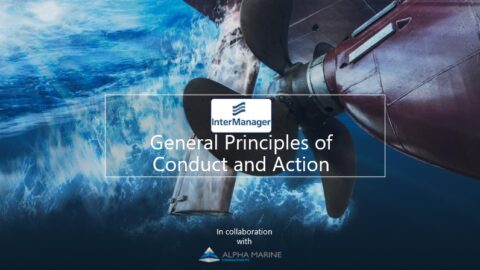The latest maritime tragedy involving Mediterranean boat migrants serves as a case in point why merchant shipping should not be a primary rescue agency to deal with the ongoing humanitarian crisis.
On Saturday night, King Jacob, a 12,850 dwt general cargoship with container capacity, received a request from the Italian Coast Guard to save migrants on an overloaded fishing boat spotted off its port side.
As the merchant vessel approach, the migrants rushed to one side of their 20 m boat, which was unstable and capsized.
Initial reports suggest there could have been as many as 700 people on the boat when the accident occurred 60 miles north of Libya, of which fewer than 50 have been saved as the rescue operations of Italian and Maltese authorities continue.
By accounts of human casualties, it is set to be the worst maritime casualty involving boat migrants in the Mediterranean.
This latest incident has drawn further concern from the secretary-general of the International Maritime Organization Koji Sekimizu, who has been campaigning to get member states to look at finalising a long-term solution to the growing problem.
“The international maritime search and rescue system created through IMO instruments was not designed to handle the huge flows of migrants that are currently being seen in the Mediterranean,” Mr Sekimizu said in a statement.
“In being compelled to embark on these unsafe vessels, migrants are effectively being put into extreme danger as soon as they leave shore. The fact that migrants are drowning within sight of their would-be rescuers is testament to the dangers they face and every effort should be taken to find safer, managed routes for migrants.”
Human trafficking in the form of migration to Europe has significantly increased since political turmoil spread over countries in North Africa and the Middle East, and merchant shipping has played an ever-growing role in humanitarian rescues.
In 2014, around 800 commercial ships diverted from their services to save the lives of 40,000 migrants attempting to reach European shores, frequently in small boats unfit for purpose, UN figures showed. Even so, more than 3,500 people lost their lives.
The situation has deteriorated this year, as the situation in those war-torn areas has not improved. Excluding the latest incident, more than 900 people are presumed dead in failed crossings so far in 2015.
Under international law and any cohesive code of morality, commercial shipowners are obliged to be engaged in rescue operations whenever necessary.
But merchant shipping has proved to be inept and insufficient for those missions, as stated by various industry groups, including the International Chamber of Shipping, many times in the past year.
In fact, the ICS, the European Community Shipowners’ Associations, the European Transport Workers’ Federation and the International Transport Workers Federation issued a joint letter in early April to all 28 European Union member states to warn that the crisis from human trafficking at sea was spiralling out of control.
This rare united front of shipowners and seafarers called on the EU to respond to the crisis with greater urgency to avoid further catastrophic loss of life.
Therefore, the main reason for the worsening humanitarian crisis seems to lie with European politicians’ lack of will to adopt adequate solutions, rather than an issue of awareness.
Many — including the ICS — have suggested that the EU will need to either take measures against human trafficking, possibly opening legal pathways to migrants, or invest more in search and rescue operations.
A step back
But anti-immigrant sentiment and the lack of financial capability have stood in the way. Since last year, European politicians have actually taken a step back by replacing Italy’s humanitarian Mare Nostrum operation with the EU-funded Triton operation, whose primary mandate is border protection and which operates with very limited resources.
The strategy came with an aim of deterring migrants due to the higher risks involved. Anecdotal evidence showed it has backfired terribly.
Following the latest accident, more calls for stronger EU measures to deal with the crisis are expected to be made, not least from the shipping side. The International Organisation for Migration has called on the EU to at least re-establish life-saving operations on the scale of Mare Nostrum.
In a statement today, the ICS said: “ICS believes the tragedy is potentially game-changing and may at last spur all EU member states to take the urgent and immediate collective action needed to prevent further massive loss of life at sea.
“In the short term, EU member states need to agree funding for an EU ‘Mare Nostrum’ operation. ICS fully supports the call from the Italian prime minister for an immediate EU summit on the crisis, and we hope that EU foreign ministers meeting in Luxembourg today will make progress on developing solutions.”
Italy has called for an emergency European summit this week to find some immediate solutions. It is unfortunate that only rapidly-rising death tolls can force politicians into action, but it would be even more unfortunate if nothing concrete can be done this time.
For latest maritime news see Lloyd’s List


[…] This post was sourced from InterManager: View original article here. […]